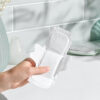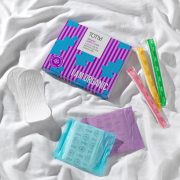Having your first period can seem scary. The idea of asking a friend or relative for help can seem somewhat embarrassing. Well, we are here to help. We caught up with our resident gynaecologist, Ms Anne Henderson, to answer all the questions you may have about your first period.
It is important that young girls aren’t afraid to speak about their period. They shouldn’t be made to feel embarrassed if they are unsure about what to use or what is/isn’t normal. Education around menstruation is SO important. This ensures that they are menstruating healthily and not putting themselves at risk of things such as Toxic Shock Syndrome (TSS).
What is the normal age to start having periods?
The age at which girls first start to menstruate has lowered over the last 20-30 years. This is due to an improvement in the health of the population, combined with increased height and weight as girls reach puberty in comparison to earlier generations. It is not uncommon nowadays for menstruation to begin or start as early as age 10-11. Although, most girls will start between the ages of 11 and 13.
Genetic influence is also important. Also, the age which your mum or other female relatives have started their periods is an influencing factor. If your mum started at an early age, then it is very likely that you will too. Similarly, if your periods do not start until 14-15, there is rarely any need for concern. But, it is worth having a check up with your GP.
Will my periods be regular from the outset?
It is very unusual for periods to settle into a regular 28-day cycle immediately. Most girls experience between 12-18 months of erratic and infrequent periods. They can sometimes be several months apart, before a regular pattern becomes established. There is rarely any need for concern when this happens, unless there are other health-related issues which may be a contributing factor. Nonetheless, if you are worrying about an irregular cycle, then it is sensible to speak to your GP or Practice Nurse for advice.
How long will my periods last and how much blood will I lose?
There is a huge range in the length and heaviness of periods. If your mum tended to have very heavy, lengthy and painful periods then it is likely that you will follow in a similar pattern. Most periods range between 4-7 days. Once the cycle is established, bleeding occurs approximately every 28 days.
Periods can start off with light loss and spotting. They become heavier around day 2-3 and then tail off once again. But, some women find that the flow is heaviest right at the start and they have no warning before the heavy bleeding begins.
When bleeding is heavier, it is not uncommon to pass clots. These can be sizeable and also have episodes of flooding. Changing sanitary protection on a regular basis is essential to prevent accidents. Once your cycle is more established, you will be able to predict when the heavy bleeding occurs. This allows you to manage this in a more effective way.
Is it normal to experience period pain?
It is very common for girls to experience period pain when their periods first start and often for several years afterwards. The medical term for this is primary dysmenorrhoea. It indicates that there is very unlikely to be an underlying disorder causing the pain. When pain starts occuring later on, and periods were initially manageable, It is known as secondary dysmenorrhoea. It is more likely to be a gynaecological problem such as endometriosis.
Pain can be very variable and may not occur throughout the whole period. It may only occur on the days of heavy blood loss. The pain is usually caused as the uterus contracts to expel clots through the closed cervix. Most cases of period pain can be managed with the use of simple analgesics such as regular Paracetamol and Ibuprofen. These work better when taken together rather than on their own. But, if you find that period pain and/or heavy flow is disrupting your life, preventing you from attending school or undertaking sporting activities, then it is sensible to seek advice from your GP.
Why do women have periods?
Menstrual bleeding represents the shedding of the womb lining. This shedding occurs on a regular basis, unless a woman becomes pregnant. At which point, her periods stop completely until she has given birth.
The monthly shedding occurs due to the hormone changes related to ovulation. These cause a build up or thickening of the womb lining to nourish and protect a possible pregnancy. If pregnancy does not occur, there is a sudden shift in a woman’s hormones. This then leads to shedding of the thickened lining, resulting in a period.
This cycle continues throughout a woman’s fertile life until she reaches the age of the menopause, usually in her early 50s. Menopause occurs when there are no more eggs to release and the cycle of change in the womb lining ceases.
What sort of sanitary protection should I use?
Many girls decide to use pads for several periods, before they feel happy to use internal protection such as tampons. This is a matter of personal choice. Some girls choose to use tampons when the flow is heavier. They then switch to pads or pantyliners when the flow is lighter.
The choice of products on the market is huge. There is different brands, a range of absorbencies and app or non-app tampons. There is also scented products and so on. The choice is almost overwhelming! Not all products are equal and it is worth thinking about your personal health when choosing products.
As with the foods we eat and beauty products we use, there is evidence that organic sanitary protection is healthier and safer. Non-organic sanitary protection is made of synthetic materials such as rayon. This, combined with the gelling agents used to increase absorbency can cause problems in the delicate genital area.
The choice of absorbency of tampons and pads is usually dictated by the heaviness of the menstrual flow. For heavy periods, use super/super plus absorbency. For light to normal flow, use light/regular absorbency. You should never use a heavy absorbency tampon with light flow. This increases the risk of Toxic Shock Syndrome (see below).
How often should I change my sanitary protection?
The frequency is usually dependent on the heaviness of the menstrual flow. But, as a general rule, it is never advisable to wear any form of internal sanitary protection, such as tampons or menstrual cups, for longer than four to six hours. If you have heavy flow, you may find it necessary to change protection much more often than this. People with a heavy flow can change as often as every one to two hours.
Leaving tampons/cups in for longer than six hours and using heavy absorbency products with a light flow is never recommended. This can increase the risk of a condition called Toxic Shock Syndrome (TSS). This is where bacteria present in the vagina and in menstrual blood can enter the blood stream. It does this via small breaches in the vaginal wall. These breaches are caused during insertion and removal of tampons/cups. They cause potentially serious sepsis. Whilst TSS fortunately remains rare, there is a surprising lack of awareness amongst women about the condition. It is usually entirely preventable, so it is very important to heed the advice about frequent tampon changes. Read TSS survivor Phoebee’s story here.
Were you horrified when you got your first period? Do you think there is enough education out there? Let us know on Twitter or drop a comment below. Remember to use the hashtag #TalkingPeriods! If you have a question about your first period, please do contact us directly – we would love to help.





